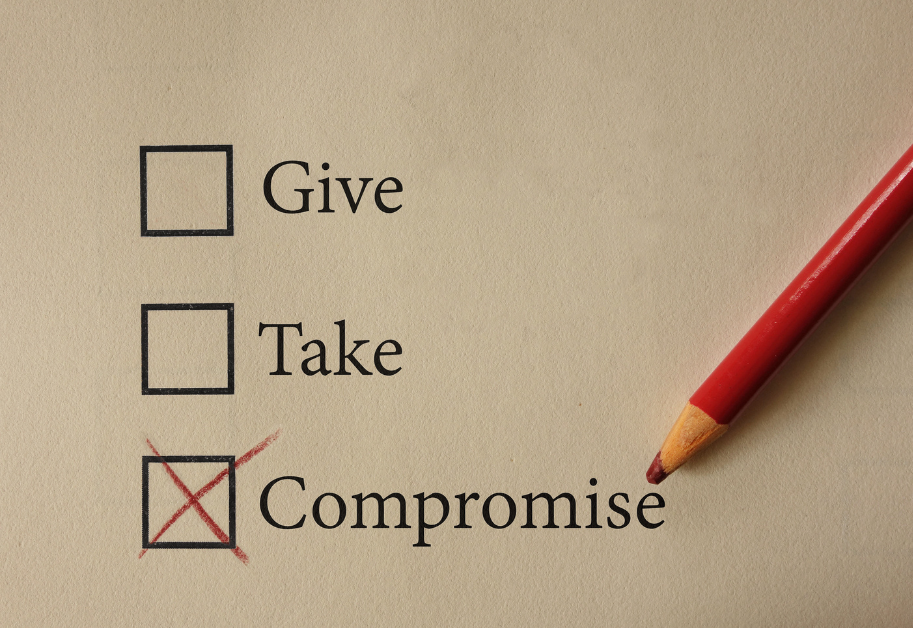Negotiation is a complex process, but a vital one for a property developer. It's a word that scares a lot of people, but it shouldn't. It's all about having a conversation in order to achieve an outcome. There, I'm sure you feel reassured now!
Okay, maybe that's over simplifying it. The challenge with negotiating is that the biggest obstacle is often yourself - your own natural inclinations and communication style. Even more challenging is that different styles of negotiation require different approaches, some of which may be totally opposite to your own personal style.
So let's take a look at some different negotiating styles and see how focusing on the outcome can help you determine your approach.
Collaborative
I'm going to start with my favourite! Collaborative negotiating is where you, as the property developer, work together with the other party to create a situation where you both get what you need. It's commonly called "win-win" negotiation.
Now, notice I said NEED, not want. Another Property Pulse article talks about negotiating so that both parties are happily unhappy.While we all want certain things from a transaction, that's quite often not what we truly need. So although you might be unhappy that you didn't get what you want, you can still be happy that you got what you need. Clear as mud?
 For this strategy you need open communication, problem-solving skills and the ability to explore multiple issues and options. If you expect to have a long-term relationship with the other party, or there are complex issues to resolve, then this is a great approach.
For this strategy you need open communication, problem-solving skills and the ability to explore multiple issues and options. If you expect to have a long-term relationship with the other party, or there are complex issues to resolve, then this is a great approach.
Compromise
In this strategy, both parties make concessions to reach an agreement, so in some ways it has similarities to the collaborative strategy. It's a middle-ground approach where each side gives up some of their requirements to find a mutually acceptable solution. Compromise is useful when time is limited or when the parties are deadlocked.
Taken to the extreme, this could become a strategy of yielding. This involves one party giving in to the demands of the other. It can be used to maintain harmony in relationships or when one party has a lower priority for the issue at hand.
Competitive
You're not likely to win a lot of friends with this strategy! It's known as a "win-lose" negotiation. It involves a fixed pie, where one party's gain is the other party's loss. It's appropriate in situations where there is a single issue to be negotiated, like price in a buyer-seller transaction.
Unfortunately, this strategy is assertive and uncooperative. It involves pursuing one's goals at the expense of the other party's goals. It's appropriate in situations where quick decisions are needed or when the stakes are high, but if you're wanting to maintain any sort of longer term relationship for future transactions, you're likely to find that's impossible if you're the one who comes out as the "winner".
Taking this to the extreme, you can also use the strategy of forcing. It's a highly aggressive way to achieve your objectives. It's typically only used when the negotiator has a strong bargaining position.
 The competitive strategy requires you to be very assertive and dominant in your approach, so going back to my earlier point about your personality getting in the way, this could be a major roadblock if your default setting is to be a people-pleaser who doesn't want to upset anyone.
The competitive strategy requires you to be very assertive and dominant in your approach, so going back to my earlier point about your personality getting in the way, this could be a major roadblock if your default setting is to be a people-pleaser who doesn't want to upset anyone.
Mediation
Sometimes, bringing in a neutral third party such as a mediator or arbitrator can help facilitate negotiations and reach a resolution. This is common in legal disputes and employment negotiations, but can also be used by you as a property developer.
Essentially, this is the role a buyer's agent takes. They do the negotiating required for you to secure a property development site. This can be a great way to remove your own personal traits from the negotiation if you feel your personal style isn't assertive enough to achieve the best outcome.
Don't Negotiate At All
Sometimes, it's best to avoid negotiations altogether, especially when the cost of negotiation outweighs the potential benefits. This strategy can be temporary or permanent, and it's often used to buy time or preserve a relationship.
If you want to at least try to negotiate first, it can be valuable to have a backup plan of ending the negotiations if they're not heading towards the outcome you want. In that case, it's good to have a BATNA in your back pocket.
What's that? I hear you ask. It's a "Best Alternative To a Negotiated Agreement". This strategy involves assessing and strengthening your position by identifying your best alternative if negotiations fail. Having a strong BATNA can give you leverage in negotiations.
Basically, if you feel not negotiating at all is probably the best choice, a BATNA you're comfortable with can give you a level of detachment from the negotiations you do attempt. Surprisingly, that might even get you an outcome you weren't expecting!
Effective negotiation often requires a combination of multiple strategies, adapted to the specific circumstances and goals of the negotiation. Skilled property developers assess the situation, the parties involved, and the desired outcomes to determine the most appropriate approach.
And most importantly, keep in mind that it's not about you getting what you want at all costs and crushing the other party into the dust. It's about achieving an outcome that gets what you need - and that outcome can be a lot bigger than just the issue you're negotiating.
Okay, maybe that's over simplifying it. The challenge with negotiating is that the biggest obstacle is often yourself - your own natural inclinations and communication style. Even more challenging is that different styles of negotiation require different approaches, some of which may be totally opposite to your own personal style.
So let's take a look at some different negotiating styles and see how focusing on the outcome can help you determine your approach.
Collaborative
I'm going to start with my favourite! Collaborative negotiating is where you, as the property developer, work together with the other party to create a situation where you both get what you need. It's commonly called "win-win" negotiation.
Now, notice I said NEED, not want. Another Property Pulse article talks about negotiating so that both parties are happily unhappy.While we all want certain things from a transaction, that's quite often not what we truly need. So although you might be unhappy that you didn't get what you want, you can still be happy that you got what you need. Clear as mud?
Compromise
In this strategy, both parties make concessions to reach an agreement, so in some ways it has similarities to the collaborative strategy. It's a middle-ground approach where each side gives up some of their requirements to find a mutually acceptable solution. Compromise is useful when time is limited or when the parties are deadlocked.
Taken to the extreme, this could become a strategy of yielding. This involves one party giving in to the demands of the other. It can be used to maintain harmony in relationships or when one party has a lower priority for the issue at hand.
Competitive
You're not likely to win a lot of friends with this strategy! It's known as a "win-lose" negotiation. It involves a fixed pie, where one party's gain is the other party's loss. It's appropriate in situations where there is a single issue to be negotiated, like price in a buyer-seller transaction.
Unfortunately, this strategy is assertive and uncooperative. It involves pursuing one's goals at the expense of the other party's goals. It's appropriate in situations where quick decisions are needed or when the stakes are high, but if you're wanting to maintain any sort of longer term relationship for future transactions, you're likely to find that's impossible if you're the one who comes out as the "winner".
Taking this to the extreme, you can also use the strategy of forcing. It's a highly aggressive way to achieve your objectives. It's typically only used when the negotiator has a strong bargaining position.
Mediation
Sometimes, bringing in a neutral third party such as a mediator or arbitrator can help facilitate negotiations and reach a resolution. This is common in legal disputes and employment negotiations, but can also be used by you as a property developer.
Essentially, this is the role a buyer's agent takes. They do the negotiating required for you to secure a property development site. This can be a great way to remove your own personal traits from the negotiation if you feel your personal style isn't assertive enough to achieve the best outcome.
Don't Negotiate At All
Sometimes, it's best to avoid negotiations altogether, especially when the cost of negotiation outweighs the potential benefits. This strategy can be temporary or permanent, and it's often used to buy time or preserve a relationship.
If you want to at least try to negotiate first, it can be valuable to have a backup plan of ending the negotiations if they're not heading towards the outcome you want. In that case, it's good to have a BATNA in your back pocket.
What's that? I hear you ask. It's a "Best Alternative To a Negotiated Agreement". This strategy involves assessing and strengthening your position by identifying your best alternative if negotiations fail. Having a strong BATNA can give you leverage in negotiations.
Basically, if you feel not negotiating at all is probably the best choice, a BATNA you're comfortable with can give you a level of detachment from the negotiations you do attempt. Surprisingly, that might even get you an outcome you weren't expecting!
Effective negotiation often requires a combination of multiple strategies, adapted to the specific circumstances and goals of the negotiation. Skilled property developers assess the situation, the parties involved, and the desired outcomes to determine the most appropriate approach.
And most importantly, keep in mind that it's not about you getting what you want at all costs and crushing the other party into the dust. It's about achieving an outcome that gets what you need - and that outcome can be a lot bigger than just the issue you're negotiating.
